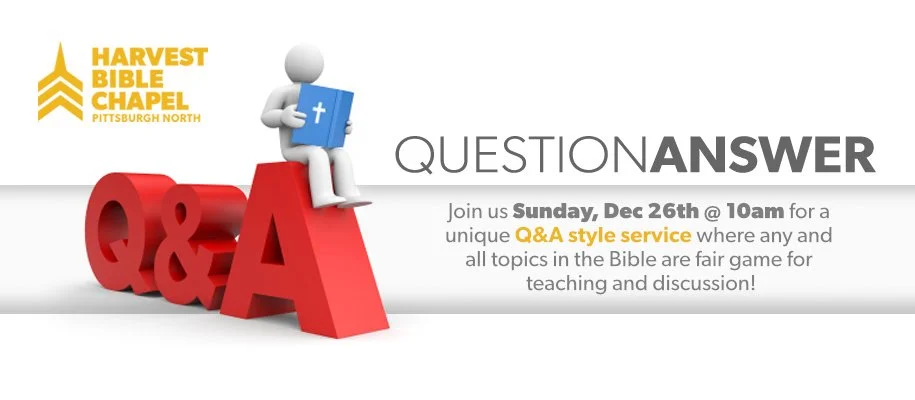Thank you to every one who submitted a question for yesterday’s Q & A Sunday! Unfortunately, we ran out of time and were unable to answer every single question from the stage. However, we’ll quickly tackle the leftover questions on this blog post.
1. Why does God allow trials in my life to test my faith, if in His sovereignty He already knows how I’ll respond (positively or negatively)?
The apostle Peter has a fantastic answer to this question in his first epistle: “In this you rejoice, though now for a little while, if necessary, you have been grieved by various trials, so that the tested genuineness of your faith—more precious than gold that perishes though it is tested by fire—may be found to result in praise and glory and honor at the revelation of Jesus Christ,” ( 1 Peter 1:6-9). There are some lessons you can only learn in the crucible of pain and hardship. Look at all of the OT and NT figures that we read about and study: Abraham, Joseph, Moses, David, Daniel, Paul, etc. All of them went through the wringer but the Lord used their hardships for His perfect purposes. It is almost impossible to gauge the strength of your faith until your faith is tested. Even though this testing can be uncomfortable and difficult, it should lead us to thanksgiving and worship.
2. Can you explain what Jesus means in Luke 14:26-27 where He says we cannot be His disciples unless we hate our fathers, mothers, brothers, sisters, children? This seems totally contradictory to His message for us to love one another as He has loved us.
Years ago, I heard a pastor preach on this passage and he said something that has stuck with me ever since: “We should love God so greatly and intensely that our love for other people should look like hate in comparison.” Matthew 10:37 communicates the same teaching of Jesus but provides a helpful perspective with different wording, “Whoever loves father or mother more than me is not worthy of me, and whoever loves son or daughter more than me is not worthy of me.” We are commanded to love our spouses, our children, our other family members, and our friends. But they should never usurp the place of God in our lives. He must be our first and greatest love.
3. Is it Biblical to still speak in tongues?
Below is an excerpt from the beliefs page on our website regarding speaking in tongues:
Harvest Bible Chapel is a non-charismatic, conservative, evangelical fellowship that welcomes all who know Jesus Christ as their Savior and all who are seeking Him. Those who claim to possess the gift of tongues and other sign gifts are welcome to worship and fellowship with us if they are willing to be a source of unity rather than division within our church body. We believe that the Christian life is supernatural and that the Lord continues to perform miracles. We also believe that current displays of the gift of tongues distract from the main task of the local church, which is to glorify God through the fulfillment of the Great Commission - Matthew 28:19-20
Current displays of the gift of tongues:
Give unwarranted prominence to the gift, which is described in the New Testament as being only one of many spiritual gifts (1 Corinthians 12).
Emphasize speaking in tongues as the primary manifestation of the Spirit's work in a person's life, while minimizing the Spirit's work in producing a holy life (2 Corinthians 3:17-18; 2 Timothy 1:9) and a life that displays the fruits of the Spirit (Galatians 5:22).
Often suggest that speaking in tongues is a required proof of being Spirit-filled or of possessing salvation in Christ, even though the Scriptures do not teach this.
Harvest Bible Chapel seeks to prevent the propagation of doctrines that would cause divisions within an individual church. Therefore, members to and adherents of Harvest Bible Chapel are not to propagate the teachings and emphases of the current charismatic movement. Although we do not control personal, individual interactions with the Lord, the expression of tongues and other sign gifts are not to be overtly expressed at meetings that are under the organization and authority of Harvest Bible Chapel.



